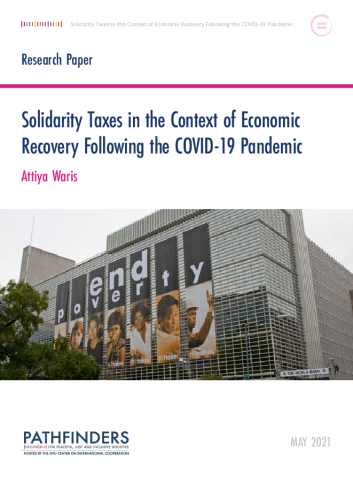Publication: Report
May 11, 2021
Solidarity Taxes in the Context of Economic Recovery Following the COVID-19 Pandemic

There are multiple examples of solidarity taxes imposed across country contexts over previous decades.
The solidarity taxes that were levied were done to mitigate effects of a crisis such as a pandemic, as well as rebuilding of nations that had been affected by world wars (examples include Zimbabwe and Germany).
Considering the renewed interest in solidarity taxes in the wake of COVID-19, this paper reviews the history of solidarity taxes, and discusses key lessons from the past, including the following:
- The taxes were levied for a specified duration, however some tended to extend for longer than initially planned.
- The solidarity taxes were widely accepted in countries where there was visible positive change and faced a backlash in countries where the tax was overextended and seen as oppressive.
- Solidarity funds that were raised in the form of voluntary contributions were more effective in cases where transparency and accountability controls were in place. For example, in South Africa, audit companies provided pro bono services to update contributions and track how the money is spent. The fund in South Africa is also displayed through their website and expenditure reports also provided, compared to the Kenyan fund whose progress is unknown.
- Most of the taxes were introduced through a form of legislation.
- For most of the solidarity taxes, their long-term impact is unknown as it remains undocumented except for countries such as Germany where the country was rebuilt and excess taxes that were collected acted as a surplus for the budget.
- Countries have a tendency to opt for wealth taxes over solidarity surcharges in the context of COVID-19. This appears to be done because wealth taxes generally target only a few of the richest taxpayers and are likely to raise more revenue over time compared to surcharges.
- Combining different types of solidarity taxes—although not a one-size-fits-all approach—appears to be a favorable option for most countries, as the benefits related to the different types of solidarity taxes can be realized.
- Solidarity taxes on income often do not target the informal sector. Where there is a large informal sector, a limited tax base, and wealth disparity, one major concern is that few will bear the burden of the tax. This was an argument raised against the Zimbabwean AIDS levy. In such a case, options include use of a fund or surcharge in the short-term and formalization of the informal sector in the long term.
- Establishment of institutions dealing with the funds or the purpose for the tax can be a good idea for some solidarity taxes. For example, in South Africa, various committees and teams were established specifically for the governance, oversight, and management of the solidarity fund.
- Another benefit of the use of solidarity taxes can be an increase in international donor support. This was seen in Zimbabwe where the AIDS levy attracted international donor support. However, the disadvantage with such a situation is that it can promote dependence and over-reliance on donor aid. The Zimbabwean scenario also demonstrates that in some instances, a country may not have adequate resources—even after putting in place good initiatives—and donor support may be necessary.
- Although solidarity taxes are generally levied during emergencies, this does limit their application to instances where no emergency exists. The levying of a solidarity tax may begin due to an emergency and continue even after the cessation of the emergency, as was the case in Germany. They can also be used to address a problem which is not urgent. For example, the Islamic wealth tax is paid annually, whether or not there exists an emergency. Discussions around the introduction of a wealth tax for the healthcare sector in the US had started before the emergence of COVID-19.
- Solidarity taxes embody elements of justice. For example, Japan’s one-off capital levy was intended to tax those who had benefited from the war. The purposes of social redistribution, alleviation of the plight of vulnerable groups, and reduction of inequality are often associated with solidarity taxes and also illustrative of notions of justice such as fairness and equality.
Download the full paper and case studies
Related Resources
